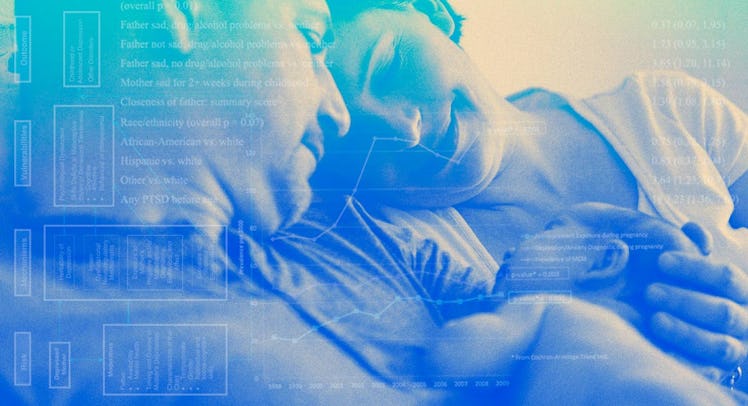Is It Irresponsible To Have A Child If You’re Depressed?
Plenty of people who struggle with depression are great parents, but there are still risks.

You shouldn’t let your mental health struggles end your dreams of parenthood. Because although it’s true that depressed men and women have children who are at increased risk of attachment issues, learning disabilities, and mental health problems, risk alone is no reason to not have children. “No one would ever feel comfortable saying, you have a history of diabetes so you shouldn’t have a child,” says Carly Snyder, M.D., a reproductive and perinatal psychiatrist. “Treatment works. If someone wants to be a parent they should have the opportunity to be a parent.”
“There are risks, but you manage those risks.”
It’s understandable why someone who struggles with chronic depression would have concerns about pregnancy and parenthood. There’s evidence that depression can have genetic roots and that, regardless, being raised by depressed parents increases the risk of depression for kids. Depressed pregnant mothers are more likely to develop gestational diabetes and hypertension, and more likely to miss OBGYN appointments. Infants born to depressed mothers have predispositions to sleep problems, attachment issues, and learning and behavioral disorders.
Isolated studies suggest these issues may arise from psychiatric medication, rather than depression itself. But Snyder maintains that pregnant people should take the full effective dose of their medications anyway — managing their symptoms entirely rather than opting for a lower dose. Because as long as it’s unclear whether depression or anti-depressants are driving poor outcomes in children, it makes little sense to expose a fetus to both low-dose medications and untreated symptoms. “We want to reduce exposure count. If she’s on a very low dose and symptomatic, that’s two exposures and no one benefits from that,” Snyder says.
Indeed, the stress of only partially treating depression puts moms at greater risk for drug and alcohol addiction, not to mention long-term stress, which is likely more dangerous than anti-depressants. In sum, the risks of being unmedicated or under-medicated are often substantially greater than the risks of anti-depressants crossing the placental barrier.
Regardless, Snyder says that adults struggling with depression need to know that they’re dealing with a medical issue that can be helped, whether they plan to have children or not. However, for people who want a family, the illness is not nearly as dangerous as the unaddressed symptoms can be. She advocates talk therapy as a good starting point — for both parents (especially since up to half of men whose partners struggle with depression during or after pregnancy experience symptoms as well). Besides, having depressed dad can be just as detrimental to children, studies suggest.
One key thing for parents to remember is that struggling does not make one a bad parent. “There are phenomenal parents who have prior depressive or anxiety symptoms, and there are phenomenal parents who are currently suffering,” Snyder says. “This is not a reason to not have children.”
This article was originally published on